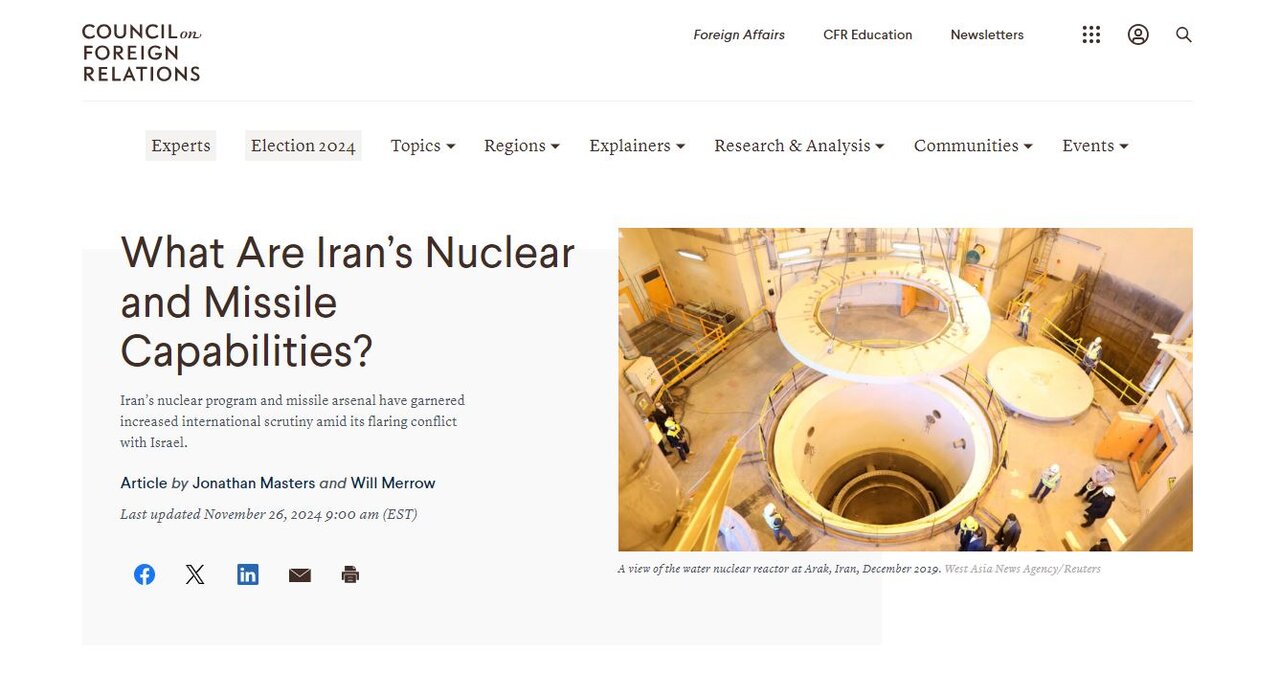By Garsha Vazirian

TEHRAN – The article, “What Are Iran’s Nuclear and Missile Capabilities?” by Jonathan Masters and Will Merrow, reflects a narrative shaped by Western and Israeli biases, overlooking Iran’s stated policies and the historical context of its actions.
Claims of destabilization
Masters and Merrow argue that a nuclear-armed Iran would destabilize the region and pose an existential threat to Israel.
However, this assertion ignores Iran’s consistent affirmation that its nuclear program serves peaceful purposes.
For example, as quoted in their article, a government spokesperson reiterated in April 2024: “Nuclear weapons have no place in our nuclear doctrine.” This long-standing position is rooted in Iran’s religious and moral principles.
Meanwhile, Israel’s nuclear arsenal—undeclared and outside the framework of the Nuclear Non-Proliferation Treaty (NPT)—is a clear source of regional destabilization that the authors fail to address.
U.S. withdrawal from the JCPOA
Masters and Merrow minimize the repercussions of the U.S.’s 2018 withdrawal from the Joint Comprehensive Plan of Action (JCPOA).
This legally binding agreement successfully limited Iran’s nuclear activities until the Trump administration abandoned it, as noted in the article.
Following the withdrawal, U.S. Secretary of State Antony Blinken admitted in June 2024 that Iran could produce fissile material for a nuclear weapon in “one or two weeks.” Yet, the authors fail to acknowledge that this occurred only after years of U.S. violations of the agreement. The blame for heightened tensions lies with Washington’s abandonment of diplomacy, not Tehran.
Mischaracterization of Iran as an aggressor
The article portrays Iran as an aggressor, citing its two missile strikes on Israeli positions in the occupied territories in 2024.
However, Masters and Merrow omit critical context: Iran’s actions were responses made in defense. Tehran’s direct attacks only came after the regime struck Iran’s embassy in Russia and assassinated key Resistance figures including Hamas leader Ismail Haniyeh in Tehran.
Such double standards frame Israel’s aggressions as justified retaliation while labelling Iran’s defensive measures as provocations.
Hypocrisy of Western allies
Masters and Merrow criticize Iran for its alleged nuclear ambitions but overlook the hypocrisy of the U.S. and its allies.
While the article discusses Israel’s October 2024 strikes on Iranian facilities, it remains silent on Israel’s undeclared nuclear arsenal.
Moreover, the U.S.—a nation with a history of using nuclear weapons and modernizing its arsenal—continues to provide unconditional support to Israel while chastising Iran. This selective focus undermines the credibility of the authors’ arguments about non-proliferation.
Iran’s right to security
Masters and Merrow suggest that Iran’s acquisition of nuclear weapons would “change the game” for U.S. and Israeli interests, dismissing Iran’s legitimate security concerns.
The article acknowledges that “U.S. intelligence officials assess that the Leader of the Islamic Republic has not made a decision to resume the nuclear weapons program that Iran suspended in 2003.” Despite this, Iran faces ongoing threats, including direct military strikes, such as Israel’s largest-ever attack on Iran in October 2024. Decades of sanctions, covert operations, and aggression have forced Iran to develop a robust defense strategy—not as an act of aggression but as a necessity.
Regional destabilization allegations
The article implies that Iran’s potential nuclear capability would spark a regional arms race, citing Saudi Crown Prince Mohammed bin Salman’s 2023 statement: “If they get one, we have to get one.”
However, Masters and Merrow fail to address the actual drivers of instability, such as massive U.S. arms sales and Israel’s unchecked militarization. While Iran’s missile capabilities, like the Fattah-1 and Kheybar Shekan, are framed as threats, similar weapons used by Israel against civilians in Gaza are ignored. This selective criticism unfairly vilifies Iran while excusing Western and Israeli actions.
Conclusion
Masters and Merrow’s article perpetuates a one-sided narrative that distorts Iran’s intentions and ignores the root causes of regional instability.
Iran remains committed to peaceful nuclear development under international law, as evidenced by decades of cooperation with the International Atomic Energy Agency (IAEA).
To de-escalate tensions, the international community must hold all actors accountable—especially those who undermine treaties and violate sovereign rights. A fair approach requires scrutinizing Israel’s nuclear arsenal, addressing the consequences of U.S. sanctions, and recognizing Iran’s right to self-defense in the face of relentless hostility.

No comments:
Post a Comment